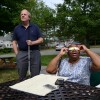The end of the pandemic in the United States isn’t going to be marked by a solemn announcement or a celebrity-studded fundraising event on TV. There are too many uncertainties.
Even as the situation improves in Massachusetts, the numbers are much higher — though dropping — in Michigan, Minnesota, Colorado and elsewhere. And, of course, the virus is causing unimaginable suffering right now in India and South America. We need to do all we can to help.
But even though there won't be a clearly defined endpoint, I’m declaring an end to COVID-19 this week. Just about every adult in the U.S. who wants to be vaccinated has now done so or will be able to soon. Masks are coming off outdoors. Schools are filling up again — safely. Indoor restaurant dining is coming back. Our long national nightmare isn’t over, but we’re slowly beginning to wake up.
We’re all going to have our own end-of-COVID story. Mine — and probably yours — begins with family. This Thursday will mark two weeks since my second Pfizer shot. By Memorial Day, my wife, son and daughter will all be at full immunity. We are incredibly lucky. Even though three of us have been regularly working outside our home, we’ve all stayed healthy.
To put a punctuation mark on it, I’m writing this column inside a local coffee shop for the first time in more than a year. The last column I wrote here was published on Feb. 26, 2020. Ironically, it was about a newspaper in Texas that had built a café next to its newsroom so that people could come in and order a burger and beer. It was an experiment in journalism and civic engagement that could help ease the local news crisis — and exactly the sort of activity that had to be put on hold once the virus began raging. Now it looks like it’s back.
Despite the increasingly upbeat feeling many of us are enjoying, the pandemic has taught us humility. Remember when we thought the shutdown would last two or three weeks? It would have been unfathomable back in March 2020 to think that it would take more than a year to begin reopening without putting everyone’s health at risk.
More than 576,000 Americans have died, and the death toll continues to rise, though at a much slower rate. And as The New York Times’ Apoorva Mandavilli reported earlier this week, the goal of achieving herd immunity is starting to look like a fantasy. Rather than eliminating the coronavirus, we’re going to have to learn to live with it. We didn’t eradicate the flu after the great pandemic of 1918, either. What we can hope for is that continued vigilance and annual vaccines will keep COVID-19, like the flu, at a manageable level.
For the foreseeable future, we’re also going to be held back by the anti-intellectualism of the Republican Party. A recent survey by the Kaiser Family Foundation found that 29% of Republicans say they will “definitely not” get vaccinated against the coronavirus, compared to 5% of Democrats and 9% of independents. It’s stunning that highly effective vaccines, like masks, have become a tribal signifier. But that’s where we’re at in a country in which one of the two major political parties has slipped into a hermetically sealed universe of alternative facts.
Disturbing as this is, though, it can wait for another day. Right now, the COVID-19 news is better than it’s been since the start of the pandemic — and it’s only going to keep improving.
This weekend, I’ll put on a cap and gown for the first time in two years and attend Northeastern University’s commencement activities at Fenway Park. Everyone will be masked and socially distanced, regardless of whether we’ve been vaccinated. But we’ll be together, in person, celebrating the success of our students as their families — well, OK, one guest per graduate — cheer from the stands.
It’s going to be great.
GBH News contributor Dan Kennedy’s blog, Media Nation, is online at dankennedy.net.




